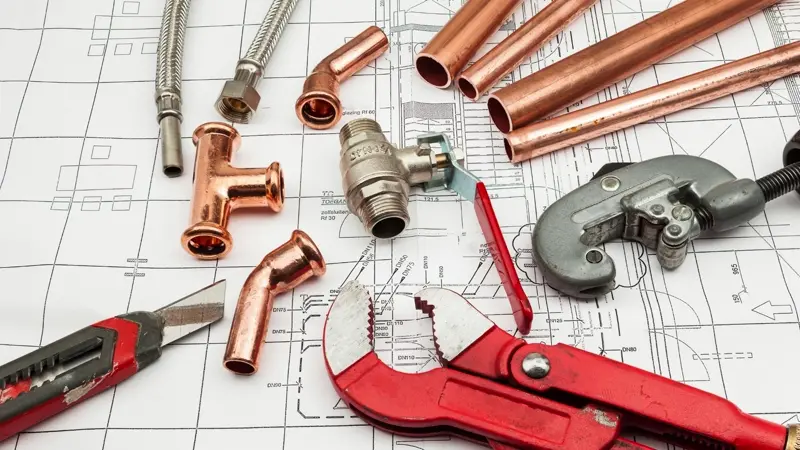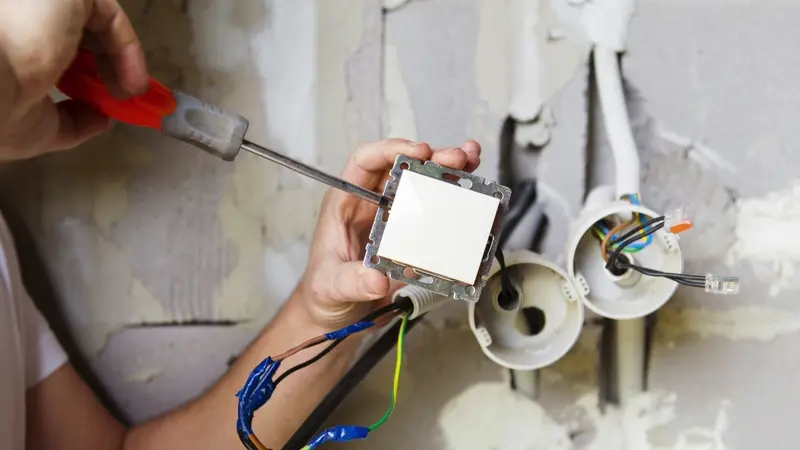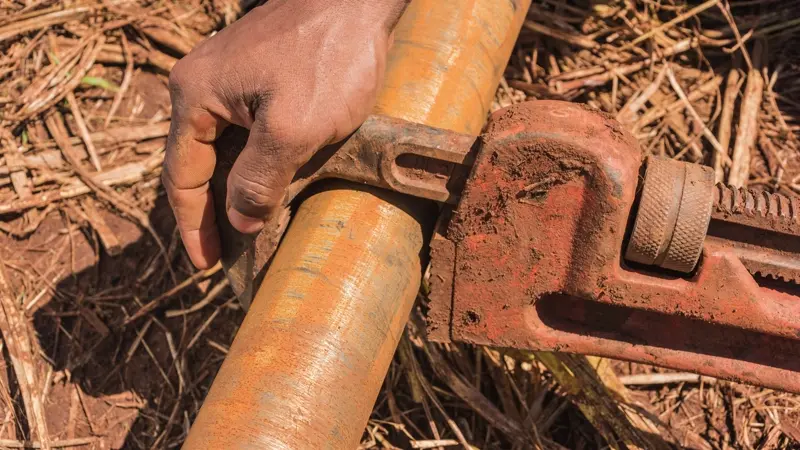Can you picture a world without clean, running water and proper waste disposal? It’s a pretty bleak thought, right? Plumbing is truly at the heart of our modern-day comforts. With the right tools at your disposal, you can conquer any plumbing challenge like a pro. So, whether you’re a seasoned expert or just a weekend warrior tackling leaks at home, having the ultimate plumbing toolbox is crucial.
Table of Contents
In this discussion, we will explore the essential tools and materials needed to maintain and repair crucial plumbing systems professionally. As we delve into the world of plumbing, your enthusiasm for do-it-yourself projects will be ignited. To enhance your plumbing expertise, we will underscore the importance of a well-equipped plumbing toolbox. So, prepare yourself to elevate your professional plumbing skills!
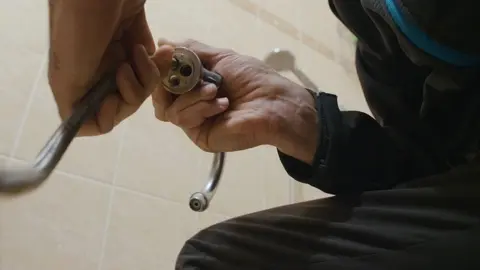
Essential Basic plumbing toolbox
Every plumber’s toolbox might look a bit different, depending on their unique needs and preferences. That being said, there are some common tools that most plumbers rely on to complete their tasks efficiently and effectively. So, let’s dive into the must-haves for any well-equipped plumbing toolkit.
Before we delve into the essential plumber’s tools, let’s simplify by dividing them into two main categories. The first category includes unique tools that set the plumber’s toolbox apart from others, which we’ll call “Basic Special Plumber’s Tools.” The second category consists of fundamental tools common among various toolboxes, referred to as “Shared Plumber Tools.”
Basic Special Plumber’s Tools
A plumbing toolbox contains a unique set of specialized tools, setting it apart from other toolboxes. These tools are specifically designed for plumbing tasks, which include the installation, repair, and maintenance of pipes, fixtures, and systems for water supply, drainage, and waste disposal. Some distinct tools found in a plumber’s toolbox are:
1. Pipe Wrench
Without a doubt, the pipe wrench holds a prominent position in a plumber’s toolbox, proving invaluable to both seasoned professionals and DIY enthusiasts. Specifically designed for turning pipes, fittings, and other round objects with ease, it greatly streamlines plumbing tasks. Furthermore, the pipe wrench features a robust construction and serrated jaws, ensuring an exceptional grip. Its adjustable jaws effortlessly accommodate different pipe sizes, making it an indispensable addition to any plumbing toolbox.
2. Basin Wrench
In the realm of plumbing, the basin wrench is an indispensable tool for installing sink basins and faucets in tight spaces where traditional wrenches fall short. This specially designed tool has an elongated T-shaped handle to access hard-to-reach areas, making it easier to navigate around obstacles. Most basin wrenches boast a swiveling, spring-loaded jaw that securely grips nuts for effortless tightening or removal. As an integral part of a professional plumbing toolbox, the basin wrench streamlines the installation process, significantly improving life for both plumbers and DIY enthusiasts.
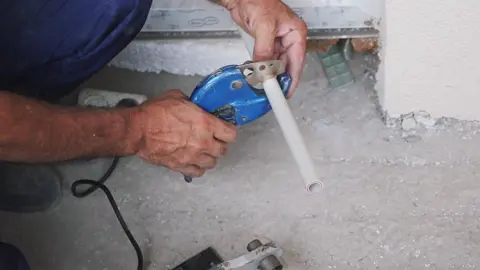
3. Pipe Cutter
Every plumber, DIY lover, and construction pro knows the value of a good pipe cutter. This trusty tool makes cutting copper or plastic pipes a breeze, giving you clean, precise cuts without needing a hacksaw. There are various types of pipe cutters out there, each with their own special use and suited for certain materials.
4. Plunger
The humble plunger might be simple, but it’s super effective. With its rubber suction cup on either a wooden or plastic handle, this handy little tool’s main job is to unclog those pesky drains in sinks, tubs, or toilets.
5. Pipe Bender
A pipe bender is like a plumber’s best friend. It helps change the shape and direction of pipes without damaging them or messing with their function. By keeping pipes kink-free and their walls smooth, water can flow uninterrupted. This tool comes in super handy when installing complex piping systems with lots of twists and turns or working in tight spaces where moving around is tricky.
6. Auger (Plumber’s Snake)
Known as an Auger or Plumber’s Snake, this must-have tool is perfect for plumbing professionals and DIY fanatics alike. Made up of a flexible metal cable that’s usually 20 to 50 feet long with a corkscrew-like end, it can wiggle through drains and sewer lines to break up and dislodge clogs that disrupt water flow or create bad smells.
7. Pipe Reamer / Deburrer
Also called a deburrer, a pipe reamer is a super handy plumbing tool that helps smooth out the edges of a newly cut pipe. Getting rid of any burrs and sharp bits is crucial to make sure you have a secure connection between your pipes and their fittings. This way, there’s less risk of leaks or other problems caused by poor connections.
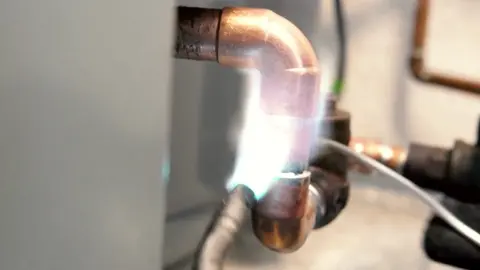
8. Plumber’s Torch
Small but mighty, the plumber’s torch uses propane to generate a powerful flame, perfect for soldering copper pipes together during installation or repair jobs. The heat from the torch melts the solder, which is essential for creating watertight, reliable pipe connections. When the solder cools and hardens, it fills in tiny gaps between the copper surfaces and bonds them together in a process known as capillary action.
Shared Plumber Tools
Even though many plumbing tools are designed for specific tasks, there are a handful of common ones that aren’t exclusive to the profession. These versatile tools can be found in various industries and even in the toolboxes of most DIY enthusiasts. Some of the tools a plumber might use, which aren’t just limited to plumbing, include:
1. Adjustable Wrench: Several instruments employed by plumbers, though not unique to the plumbing trade, remain critical in performing their regular duties. In any professional plumbing toolbox, the adjustable wrench serves as a prime example of a versatile and highly used apparatus. The adjustable wrench, a true workhorse with numerous applications, boasts an ingenious design that effortlessly adapts to accommodate various nut and bolt dimensions.
2. Tape Measure: This humble tool is essential for professionals in many fields, helping them measure lengths and distances with precision. In plumbing, a tape measure ensures that pipes are cut to the perfect length and fixtures are placed just right.
3. Screwdrivers: Plumbers rely on both flathead and Phillips screwdrivers for tasks like fastening and loosening fittings or removing and installing screws. Like a loyal friend, a trusty screwdriver is always there for them.
4. Hammer: Hammers are versatile tools, not just for plumbers but for workers in various industries. In the plumbing world, hammers can break surfaces to access hidden pipes or fasten pipes securely during installation or repair.
5. Pliers: Needle-nose pliers are great for those tight spaces or when you need to secure small components like nuts and bolts. On the other hand, slip-joint or tongue-and-groove pliers come with adjustable jaws that can grip objects of many sizes or tighten/loosen threaded connections.
6. Hacksaw: Although hacksaws are closely associated with plumbing work, they’re also used in other trades where precision cutting is needed. Plumbers value the clean cuts and minimal damage hacksaws provide during pipe replacement or repair jobs.
7. Level: Just like construction workers or carpenters, plumbers need levels to ensure their pipe and appliance installations are perfectly aligned.
8. Flashlight: Every professional needs a reliable flashlight on hand, especially plumbers who often find themselves working in dimly lit spaces such as under sinks or behind walls. A good flashlight helps them assess the situation and spot any potential issues.
9. Utility Knife: This multi-purpose tool is a favorite among tradespeople for its various applications. Plumbers, in particular, often use utility knives to cut tubing or craft custom gaskets for plumbing fixtures.
10. Work gloves: Among the essential items in a plumber’s arsenal is a pair of reliable work gloves. These gloves serve several crucial functions, such as shielding the plumber’s hands from potential cuts or abrasions which could result from handling sharp materials or tools. Additionally, work gloves offer essential protection against the contaminants and irritants commonly encountered in plumbing environments, such as chemicals or mold.
11. Safety goggles: Plumbers, in particular, often find themselves needing to perform tasks such as cutting pipes, soldering joints, or working in cramped and dirty environments where particles may be easily dislodged. By diligently wearing safety goggles, plumbers can significantly reduce their chances of suffering an eye injury during these activities.
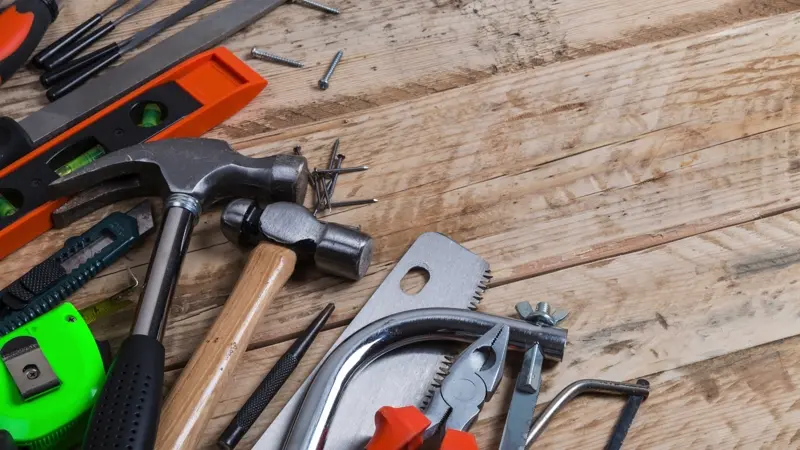
Materials Needed for Various Plumbing Tasks
- Teflon Lubricant: Teflon lubricant is a fantastic non-staining compound that’s perfect for reducing friction in your plumbing fixtures like faucets and valves. With its unique properties, it not only makes things run smoothly and efficiently, but can also prolong the life of your fixtures. Plus, since it’s non-corrosive, you won’t have to worry about it damaging your materials or causing rust.
- Plumber’s Putty: Plumber’s Putty is like magic in the hands of professional plumbers and DIY enthusiasts. This soft, clay-like substance offers incredible versatility in creating watertight seals around fixtures and drains, protecting against water damage. But what really sets Plumber’s Putty apart is its ability to stay soft and flexible even after it’s applied, meaning it never fully hardens. This makes any future adjustments or repairs way easier to deal with.
- Plumber’s Tape: Otherwise known as Teflon tape or thread seal tape, Plumber’s Tape is the superhero of plumbing and pipe installation! This thin white adhesive tape is designed especially for creating secure, watertight seals between threaded pipe connections. Its amazing flexibility and stickiness make it easy to use and great at stopping leaks, whether you’re working on household plumbing or industrial pipelines.
- Pipe dope or joint compound: When you’re dealing with pipe connections, pipe dope or joint compound is the hero you need on hand. This super useful paste will make sure everything stays sealed tight so no water can sneak through when two pipes are joined together. By using pipe dope or joint compound correctly, not only can you save water, but you’ll also prevent potential damage and hazards to your property.
- PVC primer and glue: In the world of construction and plumbing, PVC primer and glue go together like peanut butter and jelly. They work together to create super strong connections between two sections of PVC pipe. First, the PVC primer cleans and softens the pipes, making it easier for the glue to bond with them. Then, the special PVC glue is applied evenly on each side of the connection, guaranteeing a long-lasting and sturdy bond.
Conclusion
Plumbing holds a significant role in our daily routines, ensuring access to clean water and an efficient waste disposal system. In order to address plumbing concerns like an expert, it is crucial to possess a well-equipped toolbox consisting of both fundamental plumber-specific devices and generic tools commonly found in most toolsets. Equipped with the appropriate tools, you can maintain optimal performance of the vital plumbing systems, irrespective of whether you are an experienced professional or simply managing DIY projects at home. A well-organized plumbing toolbox guarantees that you are always prepared to tackle any potential issues effectively and efficiently.
